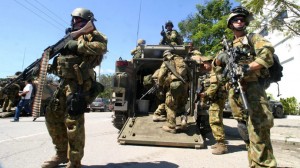
Australians return to Iraq to confront IS militants on ground
Canberra has authorized deployment of special forces to Iraq to join operation against militants of the Islamic State. From now on, the Australian Air Force craft present in the region will also take part in combat missions against terrorists.
t has only ever been a matter of time that Australia’s 600 military personnel and aircraft deployed to a United Arab Emirates airbase in mid-September would be officially used in military operations against the forces of the Islamic State (IS, formerly ISIS/ISIL) terrorist organization in Iraq.
Nearly two months after the US-led alliance of European and Persian Gulf nations started to inflict airstrikes on the IS target in Iraq and then Syria, Australia’s Prime Minister Tony Abbott announced in a nationally televised news conference that the country is joining the military operation against the “murderous death cult,” as Abbot put it, in earnest.
“Today, cabinet has authorized Australian airstrikes in Iraq at the request of the Iraqi government and in support of the Iraqi government,” Abbott announced on Friday. “Also, subject to final legal documentation, cabinet has authorized the deployment of Australian special forces into Iraq to advise and assist Iraqi forces,” he said.
At the moment Canberra has 400 Air Force personnel supporting deployment of the Australian task force at al-Minhad Air Base south of Dubai, UAE. There are also 200 Australian military officers at the same airbase, including a Special Forces team expected to operate on the ground as military advisers.
The Royal Australian Air Force in UAE is presented with eight F/A18 Super Hornet jets, one E-7A Wedgetail Airborne Early Warning and Control aircraft, one KC-30A multi-role aerial tanker and a C-17 Globemaster and a C130 Hercules transport aircraft, providing airlift assistance with transportation of military equipment, arms and munitions to Iraqi forces.
While Australian PM said that national special forces will be present in Iraq with an “advise and assist” mission, also because “The Americans certainly have quite a substantial special forces component on the ground already,” Abbott said.
At the same time he noted that in his understanding, “There are UK and Canadian special forces already inside Iraq, so we’ll be operating on a much smaller scale, but in an entirely comparable way to the United States special forces.”
Tony Abbott acknowledged that the IS poses a grave threat to the whole world, Australia included, and that it is Canberra’s responsibility to contribute militarily to anti-IS alliance.
“IS has effectively declared war on the world. The world is responding,” Abbott said.
The members of the anti-IS coalition should be ready for a long-lasting military campaign against the Islamic State. As US Defense Secretary Chuck Hagel said after meeting his French counterpart on Thursday, this “is going to be difficult and it’s going to be long. And there were no misconceptions when we started this that there would be any quick finish.”
Abbott said “I want to reassure the Australian people that it will be as long as it needs to be, but as short as it possibly can be.”




